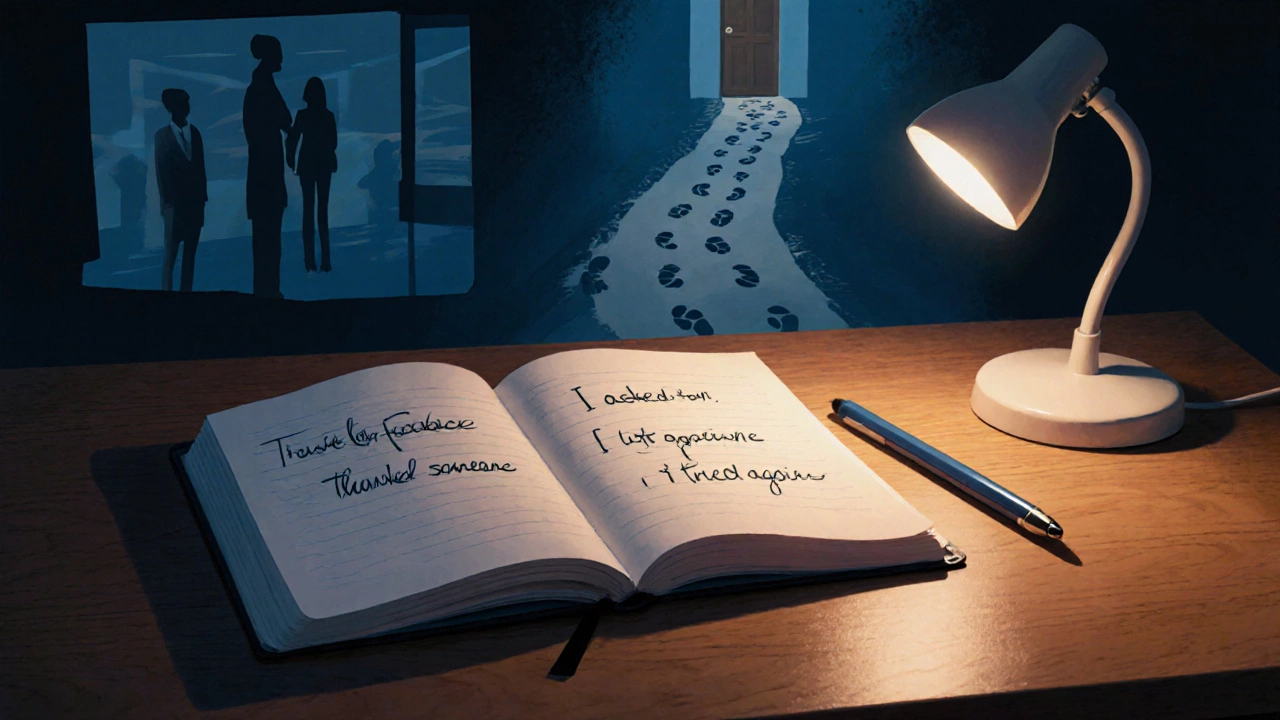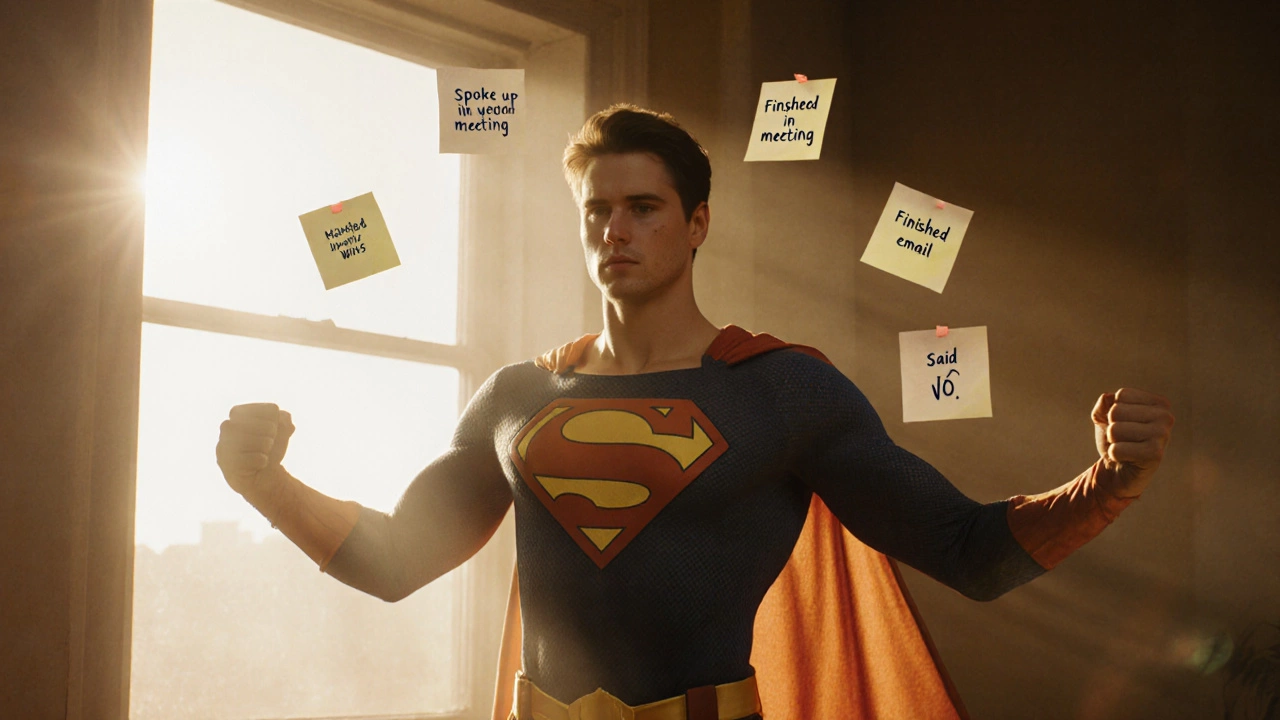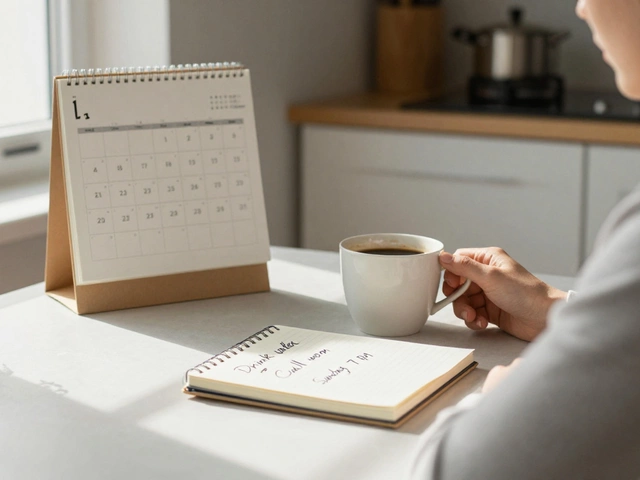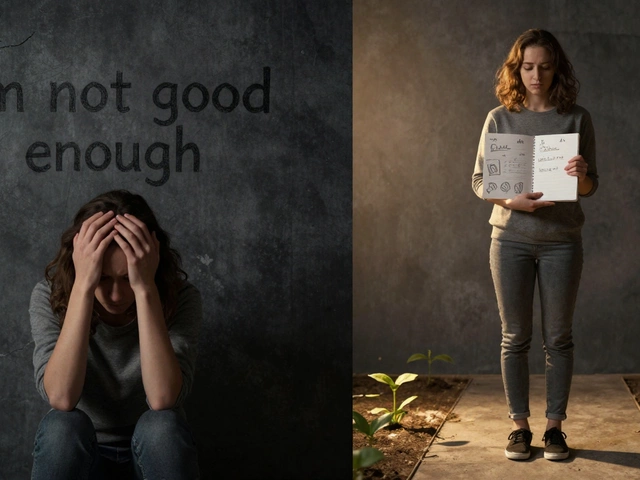Daily Confidence Wins Tracker
Track Your Confidence Wins
Write down 1-3 small actions you took today that built your confidence. These aren't big achievements - they're the daily steps that make a difference.
Your Progress
Last updated todayToday's Wins
Weekly Trend
Do you ever feel like everyone else knows what they’re doing - while you’re just pretending? You’re not alone. Millions of people walk around with the same quiet doubt: self-confidence doesn’t come from a magic trick. It’s built, one small action at a time.
Stop waiting to feel confident - act like you are
Most people think confidence comes before action. That’s backwards. You don’t wait until you feel ready to speak up, apply for a job, or ask someone out. You act - and confidence follows.
Think about it: when was the last time you felt confident before doing something hard? Probably never. You felt nervous, shaky, maybe even sick to your stomach. But you did it anyway. And afterward? You felt stronger. That’s not coincidence. It’s how the brain works.
Every time you push through fear, your brain updates its belief: “I can handle this.” Over time, those small wins stack up. You stop seeing yourself as someone who can’t do things - and start seeing yourself as someone who does them, even when it’s hard.
Track your wins - no matter how small
Confidence isn’t built on big achievements. It’s built on consistency. That’s why keeping a daily win log works better than any motivational quote.
Every night, write down three things you did well that day. Not “I got promoted.” That’s rare. Try: “I spoke up in the meeting,” “I finished the email I’d been avoiding,” “I said no to something I didn’t want to do.”
These aren’t just feel-good notes. They’re evidence. Your brain tends to focus on what went wrong - so you have to actively remind it of what went right. After two weeks, flip back through your list. You’ll see a pattern: you’re doing more than you think.
Stop comparing yourself to others
Scrolling through social media and thinking, “Why can’t I be like them?” is like comparing your behind-the-scenes to someone else’s highlight reel. It’s unfair. And it’s killing your confidence.
Here’s a simple rule: if you catch yourself comparing, ask: “Is this helping me move forward - or just making me feel worse?” If it’s the latter, close the app. Walk away. Redirect your energy.
Instead of looking at others, look at your past self. Where were you a year ago? What did you struggle with then that you’ve already overcome? That’s your real benchmark. Progress, not perfection.
Body language changes your mind - not the other way around
Confidence isn’t just in your head. It’s in your posture, your voice, your walk.
Stanford researchers found that holding a “power pose” for just two minutes - standing tall, hands on hips, chest open - actually increases testosterone and lowers cortisol. That’s science. Your body isn’t just reflecting your confidence. It’s creating it.
Try this: before a tough conversation, a job interview, or even a social event, find a quiet space. Stand like a superhero for 90 seconds. Breathe. Feel your feet on the ground. Then walk in. You won’t feel like a superhero - but you’ll feel more in control than you did five minutes before.
Practice speaking up - even when your voice shakes
One of the fastest ways to build self-confidence is to get comfortable being heard. That means speaking up - even when you’re scared.
Start small. In a group chat, reply first. In a meeting, say one clear sentence. At dinner, share an opinion instead of nodding along. Don’t aim for brilliance. Aim for consistency.
Here’s the truth: most people aren’t listening for perfect words. They’re listening for connection. Your voice - shaky or not - matters. The more you use it, the less scary it becomes.
And if you mess up? So what. Everyone does. The people who seem confident? They’ve messed up too. They just didn’t let one mistake define them.

Surround yourself with people who lift you up
Confidence isn’t built in isolation. It’s shaped by the people around you.
Think about the last time you spent time with someone who constantly criticizes, puts you down, or makes you feel “not enough.” How did you feel afterward? Drained? Smaller? That’s not a coincidence.
Now think about someone who believes in you - even when you don’t. How do you feel around them? Lighter? Stronger? That’s the energy you need to surround yourself with.
You don’t have to cut everyone off. But you do need to limit time with people who drain your self-worth. And seek out those who challenge you kindly, celebrate your wins, and remind you of your strengths when you forget them.
Learn to accept praise - without deflecting
When someone says, “You did a great job on that presentation,” do you say: “Oh, it was nothing,” or “I just got lucky”?
That’s not humility. That’s self-sabotage. Every time you brush off praise, you’re telling your brain: “I don’t deserve this.” And over time, you start to believe it.
Try this instead: say “Thank you.” Just that. No excuses. No explanations. No “but.”
It feels awkward at first. That’s normal. But each time you accept praise without shrinking, you’re rewiring your brain to accept that you’re capable. And that’s the foundation of real confidence.
Failure isn’t the opposite of confidence - it’s part of it
You’re going to mess up. You’re going to say the wrong thing. You’re going to get rejected. You’re going to feel like a fraud.
That’s not a sign you’re failing. That’s a sign you’re trying.
Confident people aren’t the ones who never fail. They’re the ones who keep going after they do. They don’t see failure as proof they’re not good enough. They see it as feedback.
After every stumble, ask: “What did I learn?” Not “Why did I fail?”
One person who didn’t get the job? They asked for feedback. They used it to improve. Next time, they got the job. That’s not luck. That’s confidence in action.
Confidence isn’t loud - it’s quiet and consistent
You don’t need to be the loudest person in the room. You don’t need to have all the answers. You don’t need to be fearless.
Real confidence is quiet. It’s showing up when you’re tired. It’s speaking up even when your voice shakes. It’s trying again after you’ve been knocked down. It’s choosing yourself - even when no one else is watching.
It’s not about becoming someone else. It’s about becoming more of who you already are - with all your flaws, your fears, and your strengths.
Start today. Do one thing that scares you. Write down one win. Say thank you when someone compliments you. Stand tall for 90 seconds. These aren’t big moves. But they’re the only moves that matter.
Confidence doesn’t arrive in a flash. It grows slowly - like a tree. You won’t see it changing day to day. But look back in six months, and you’ll wonder how you ever doubted yourself.

What if I don’t see results right away?
Confidence builds in silence. You won’t wake up one morning and feel like a different person. That’s not how change works. It’s the quiet accumulation of small choices - showing up, speaking up, trying again - that shifts your self-image over time.
If you’ve been working on this for a month and still feel unsure, that’s okay. You’re not behind. You’re in the middle of the process. Keep going.
Can I build confidence without therapy?
Yes. Many people build strong self-confidence through daily habits, supportive relationships, and consistent action. Therapy helps - especially if you’ve had deep wounds or long-term self-doubt - but it’s not the only path. The steps above are proven, practical, and free.
What if I’m shy? Does that mean I can’t be confident?
Shyness and lack of confidence are not the same thing. You can be shy - quiet, reserved, prefer small groups - and still be deeply confident. Confidence isn’t about being outgoing. It’s about trusting yourself to handle whatever comes your way. Many of the most confident people I know are quiet. They just don’t let fear stop them.
How long does it take to build real confidence?
There’s no timeline. But most people start noticing a shift after 30 days of consistent practice. After 90 days, the change becomes undeniable. It’s not about speed. It’s about showing up every day, even when you don’t feel like it.
What’s the biggest mistake people make trying to gain confidence?
Waiting to feel ready. Confidence doesn’t come before action - it comes from it. The longer you wait to feel 100% sure, the longer you stay stuck. Start before you’re ready. That’s the rule.






